Bibliometric Review of Research on Knowledge Management and Sustainability, 1994–2018
Abstract
1. Introduction
- What is the topography of KM and Sustainability in terms of time and geography?
- What are the influential contributions to the knowledge base on KM and Sustainability in terms of authors and documents?
- What is the intellectual structure of the knowledge base on KM and Sustainability?
- What is the ‘research front’ in terms of topical trends in studies KM and Sustainability?
2. Conceptual Framework
3. Materials and Methods
3.1. Identification of Sources
3.2. Data Analysis
4. Results
4.1. Growth Trajectory and Geographical Distribution of the KM and Sustainability Literature
4.2. Key Authors and Documents
4.3. Intellectual Structure of the Knowledge Base on KM and Sustainability
4.4. Topical Trends in the KM and Sustainability Knowledge Base
5. Discussion
5.1. Limitations
5.2. Interpretation and Implications
6. Conclusions
Author Contributions
Funding
Conflicts of Interest
References
- Giddings, B.; Hopwood, B.; O’brien, G. Environment, economy and society: Fitting them together into sustainable development. Sustain. Dev. 2002, 10, 187–196. [Google Scholar] [CrossRef]
- World Commission on Environment and Development. Our Common Future (‘The Brundtland Report’); Oxford University Press: Oxford, UK, 1987. [Google Scholar]
- Griggs, D.; Stafford-Smith, M.; Gaffney, O.; Rockström, J.; Öhman, M.C.; Shyamsundar, P.; Steffen, W.; Glaser, G.; Kanie, N.; Noble, I. Policy: Sustainable development goals for people and planet. Nature 2013, 19, 305. [Google Scholar] [CrossRef] [PubMed]
- Kuhlman, T.; Farrington, J. What is sustainability? Sustainability 2010, 2, 3436–3448. [Google Scholar] [CrossRef]
- Kates, R.W.; Clark, W.C.; Corell, R.; Hall, J.M.; Jaeger, C.C.; Lowe, I.; McCarthy, J.J.; Schellnhuber, H.J.; Bolin, B.; Dickson, N.M.; et al. Sustainability science. Science 2001, 292, 641–642. [Google Scholar] [CrossRef] [PubMed]
- Tzortzaki, A.M.; Mihiotis, A. A review of KM theory and future directions. Knowl. Process Manag. 2014, 21, 29–41. [Google Scholar] [CrossRef]
- Alavi, M.; Leidner, D.E. KM and KM systems: Conceptual foundations and research issues. Mis Q. 2001, 25, 107–136. [Google Scholar] [CrossRef]
- Castro Laszlo, K.; Laszlo, A. Evolving knowledge for development: The role of KM in a changing world. J. KM 2002, 6, 400–412. [Google Scholar]
- Martins, V.W.B.; Rampasso, I.S.; Anholon, R.; Quelhas, O.L.G.; Leal Filho, W. Knowledge management in the context of sustainability: Literature review and opportunities for future research. J. Clean. Prod. 2019, 229, 489–500. [Google Scholar] [CrossRef]
- Fazey, I.; Evely, A.C.; Reed, M.S.; Stringer, L.C.; Kruijsen, J.; White, P.C.; Newsham, A.J.; Jin, L.; Cortazzi, M.; Blackstock, K. Knowledge exchange: A review and research agenda for environmental management. Environ. Conserv. 2013, 40, 19–36. [Google Scholar] [CrossRef]
- Gu, Y. Global knowledge management research: A bibliometric analysis. Scientometrics 2004, 61, 171–190. [Google Scholar] [CrossRef]
- Gaviria-Marin, M.; Merigo, J.M.; Popa, S. Twenty years of the Journal of Knowledge Management: A bibliometric analysis. J. Knowl. Manag. 2018, 22, 1655–1687. [Google Scholar] [CrossRef]
- Gaviria-Marin, M.; Merigó, J.M.; Baier-Fuentes, H. Knowledge management: A global examination based on bibliometric analysis. Technol. Forecast. Soc. Chang. 2019, 140, 194–220. [Google Scholar] [CrossRef]
- Adams, W.M. The future of sustainability: Re-thinking environment and development in the twenty-first century. Rep. IUCN Renowned Think. Meet. 2006, 29, 31. [Google Scholar]
- Basiago, A.D. Economic, social, and environmental sustainability in development theory and urban planning practice. Environmentalist 1998, 19, 145–161. [Google Scholar] [CrossRef]
- Khan, M.A. Sustainable development: The key concepts, issues and implications. Keynote Paper Given at the International Sustainable Development Research Conference, 27–29 March 1995, Manchester, UK. Sustain. Dev. 1995, 3, 63–69. [Google Scholar] [CrossRef]
- Dempsey, N.; Bramley, G.; Power, S.; Brown, C. The social dimension of sustainable development: Defining urban social sustainability. Sustain. Dev. 2011, 19, 289–300. [Google Scholar] [CrossRef]
- Waage, J.; Yap, C.; Bell, S.; Levy, C.; Mace, G.; Pegram, T.; Unterhalter, E.; Dasandi, N.; Hudson, D.; Kock, R.; et al. Governing the UN Sustainable Development Goals: Interactions, infrastructures, and institutions. Lancet Glob. Health 2015, 3, e251–e252. [Google Scholar] [CrossRef]
- Ho, C.F.; Hsieh, P.H.; Hung, W.H. Enablers and processes for effective KM. Ind. Manag. Data Syst. 2014, 144, 734–754. [Google Scholar] [CrossRef]
- Krylova, K.O.; Vera, D.; Crossan, M. Knowledge transfer in knowledge-intensive organizations: The crucial role of improvisation in transferring and protecting knowledge. J. Knowl. Manag. 2016, 20, 1045–1064. [Google Scholar] [CrossRef]
- Marsh, H.W.; Jayasinghe, U.W.; Bond, N.W. Improving the peer-review process for grant applications: Reliability, validity, bias, and generalizability. Am. Psychol. 2008, 63, 160. [Google Scholar] [CrossRef]
- Moher, D.; Liberati, A.; Tetzlaff, J.; Altman, D.G. Preferred reporting items for systematic reviews and meta-analyses: The PRISMA statement. Ann. Intern. Med. 2009, 151, 264–269. [Google Scholar] [CrossRef] [PubMed]
- Mongeon, P.; Paul-Hus, A. The journal coverage of Web of Science and Scopus: A comparative analysis. Scientometrics 2016, 106, 213–228. [Google Scholar] [CrossRef]
- Harzing, A.W.; Alakangas, S. Google Scholar, Scopus and the Web of Science: A longitudinal and cross-disciplinary comparison. Scientometrics 2016, 106, 787–804. [Google Scholar] [CrossRef]
- Van Eck, N.; Waltman, L. Software survey: VOSviewer, a computer program for bibliometric mapping. Scientometrics 2009, 84, 523–538. [Google Scholar] [CrossRef] [PubMed]
- Boyack, K.W.; Klavans, R. Co-citation analysis, bibliographic coupling, and direct citation: Which citation approach represents the research front most accurately? J. Am. Soc. Inf. Sci. Technol. 2010, 61, 2389–2404. [Google Scholar] [CrossRef]
- Zupic, I.; Čater, T. Bibliometric methods in management and organization. Organ. Res. Methods 2015, 18, 272–429. [Google Scholar] [CrossRef]
- White, H.D.; McCain, K.W. Visualizing a discipline: An author co-citation analysis of information science, 1972–1995. J. Am. Soc. Inf. Sci. 1998, 49, 327–355. [Google Scholar]
- Haustein, S.; Larivière, V. The use of bibliometrics for assessing research: Possibilities, limitations and adverse effects. In Incentives and Performance; Springer: Cham, Switzerland, 2015; pp. 121–139. [Google Scholar]
- Seglen, P.O. Why the impact factor of journals should not be used for evaluating research. BMJ 1997, 314, 498–502. [Google Scholar] [CrossRef]
- Bettencourt, L.M.; Lobo, J.; Helbing, D.; Kühnert, C.; West, G.B. Growth, innovation, scaling, and the pace of life in cities. Proc. Natl. Acad. Sci. USA 2007, 104, 7301–7306. [Google Scholar] [CrossRef]
- Hatch, N.W.; Dyer, J.H. Human capital and learning as a source of sustainable competitive advantage. Strateg. Manag. J. 2004, 25, 1155–1178. [Google Scholar] [CrossRef]
- Phaal, R.; Farrukh, C.J.; Probert, D.R. Technology roadmapping—A planning framework for evolution and revolution. Technol. Forecast. Soc. Chang. 2004, 71, 5–26. [Google Scholar] [CrossRef]
- Yew Wong, K. Critical success factors for implementing knowledge management in small and medium enterprises. Ind. Manag. Data Syst. 2005, 105, 261–279. [Google Scholar] [CrossRef]
- Caloghirou, Y.; Kastelli, I.; Tsakanikas, A. Internal capabilities and external knowledge sources: Complements or substitutes for innovative performance? Technovation 2004, 24, 29–39. [Google Scholar] [CrossRef]
- Almeida, P.; Phene, A. Subsidiaries and knowledge creation: The influence of the MNC and host country on innovation. Strateg. Manag. J. 2004, 25, 847–864. [Google Scholar] [CrossRef]
- Raymond, C.M.; Fazey, I.; Reed, M.S.; Stringer, L.C.; Robinson, G.M.; Evely, A.C. Integrating local and scientific knowledge for environmental management. J. Environ. Manag. 2010, 91, 1766–1777. [Google Scholar] [CrossRef]
- Schipper, L.; Pelling, M. Disaster risk, climate change and international development: Scope for, and challenges to, integration. Disasters 2006, 30, 19–38. [Google Scholar] [CrossRef]
- Chandrasegaran, S.K.; Ramani, K.; Sriram, R.D.; Horváth, I.; Bernard, A.; Harik, R.F.; Gao, W. The evolution, challenges, and future of knowledge representation in product design systems. Comput. Aided Des. 2013, 45, 204–228. [Google Scholar] [CrossRef]
- Liu, J.Q.; Hull, V.; Batistella, M.; DeFries, R.; Dietz, T.; Fu, F.; Hertel, T.W.; Izaurralde, R.C.; Lambin, E.F.; Li, S.; et al. Framing sustainability in a telecoupled world. Ecol. Soc. 2013, 18, 26. [Google Scholar] [CrossRef]
- Roux, D.J.; Rogers, K.H.; Biggs, H.; Ashton, P.J.; Sergeant, A. Bridging the science–management divide: Moving from unidirectional knowledge transfer to knowledge interfacing and sharing. Ecol. Soc. 2006, 11, 4. [Google Scholar] [CrossRef]
- Van Kerkhoff, L.; Lebel, L. Linking knowledge and action for sustainable development. Annu. Rev. Environ. Resour. 2006, 31, 445–477. [Google Scholar] [CrossRef]
- Olsen, K.H. The clean development mechanism’s contribution to sustainable development: A review of the literature. Clim. Chang. 2007, 84, 59–73. [Google Scholar] [CrossRef]
- Nambisan, S.; Agarwal, R.; Tanniru, M. Organizational mechanisms for enhancing user innovation in information technology. MIS Q. 1999, 23, 365–395. [Google Scholar] [CrossRef]
- Dao, V.; Langella, I.; Carbo, J. From green to sustainability: Information Technology and an integrated sustainability framework. J. Strateg. Inf. Syst. 2011, 20, 63–79. [Google Scholar] [CrossRef]
- Chambers, D.A.; Glasgow, R.E.; Stange, K.C. The dynamic sustainability framework: Addressing the paradox of sustainment amid ongoing change. Implement. Sci. 2013, 8, 117. [Google Scholar] [CrossRef] [PubMed]
- Viviroli, D.; Archer, D.R.; Buytaert, W.; Fowler, H.J.; Greenwood, G.; Hamlet, A.F.; Huang, Y.; Koboltschnig, G.; Litaor, M.I.; López-Moreno, J.I.; et al. Climate change and mountain water resources: Overview and recommendations for research, management and policy. Hydrol. Earth Syst. Sci. 2011, 15, 471–504. [Google Scholar] [CrossRef]
- Shen, L.Y.; Ochoa, J.J.; Shah, M.N.; Zhang, X. The application of urban sustainability indicators–A comparison between various practices. Habitat Int. 2011, 35, 17–29. [Google Scholar] [CrossRef]
- Fuhrer, J.; Booker, F. Ecological issues related to ozone: Agricultural issues. Environ. Int. 2003, 29, 141–154. [Google Scholar] [CrossRef]
- Sharif, N. Emergence and development of the National Innovation Systems concept. Res. Policy 2006, 35, 745–766. [Google Scholar] [CrossRef]
- Nonaka, I. A dynamic theory of organizational knowledge creation. Organ. Sci. 1994, 5, 14–37. [Google Scholar] [CrossRef]
- Nonaka, I.; Takeuchi, H. The Knowledge-Creating Company: How Japanese Companies Create the Dynamics of Innovation; Oxford University Press: Oxford, UK, 1995. [Google Scholar]
- Cohen, W.M.; Levinthal, D.A. Absorptive capacity: A new perspective on learning and innovation. Adm. Sci. Q. 1990, 35, 128–152. [Google Scholar] [CrossRef]
- Wenger, E. Communities of Practice: Learning, Meaning, and Identity; Cambridge University Press: Cambridge, UK, 1999. [Google Scholar]
- Davenport, T.H.; Prusak, L. Working Knowledge: How Organizations Manage What They Know; Harvard Business Press: Boston, MA, USA, 1998. [Google Scholar]
- Porter, M.E. Competitive Advantage: Creating and Sustaining Superior Performance; Simon and Schuster: New York, NY, USA, 2008. [Google Scholar]
- Grant, R.M. Toward a knowledge-based theory of the firm. Strateg. Manag. J. 1996, 17, 109–122. [Google Scholar] [CrossRef]
- Teece, D.J.; Pisano, G.; Shuen, A. Dynamic capabilities and strategic management. Strateg. Manag. J. 1997, 18, 509–533. [Google Scholar] [CrossRef]
- Polanyi, M. The Tacit Dimension; University of Chicago Press: Chicago, IL, USA, 2009. [Google Scholar]
- Folke, C. Resilience: The emergence of a perspective for social–ecological systems analyses. Glob. Environ. Chang. 2006, 16, 253–267. [Google Scholar] [CrossRef]
- Berkes, F.; Folke, C.; Colding, J. Linking Social and Ecological Systems: Management Practices and Social Mechanisms for Building Resilience; Cambridge University Press: Cambridge, UK, 2000. [Google Scholar]
- Holling, C.S. Resilience and stability of ecological systems. Annu. Rev. Ecol. Syst. 1973, 4, 1–23. [Google Scholar] [CrossRef]
- Ostrom, E. Governing the Commons; Cambridge University Press: Cambridge, UK, 2015. [Google Scholar]
- Reed, M.S. Stakeholder participation for environmental management: A literature review. Biol. Conserv. 2008, 141, 2417–2431. [Google Scholar] [CrossRef]
- Scholz, R.W.; Tietje, O. Embedded Case Study Methods: Integrating Quantitative and Qualitative Knowledge; Sage: Thousand Oaks, CA, USA, 2002. [Google Scholar]
- Scholz, R.W.; Binder, C.R. Environmental Literacy in Science and Society: From Knowledge to Decisions; Cambridge University Press: Cambridge, UK, 2011. [Google Scholar]
- Wiek, A.; Withycombe, L.; Redman, C.L. Key competencies in sustainability: A reference framework for academic program development. Sustain. Sci. 2011, 6, 203–218. [Google Scholar] [CrossRef]
- Nowotny, H.; Scott, P.; Gibbons, M. Re-Thinking Science: Knowledge and the Public in an Age of Uncertainty; Polity Press: Cambridge, UK, 2001. [Google Scholar]
- Argyris, C.; Schon, D.A. Theory in Practice: Increasing Professional Effectiveness; Jossey-Bass: San Francisco, CA, USA, 1974. [Google Scholar]
- Argyris, C. Teaching smart people how to learn. Harv. Bus. Rev. 1991, 69, 4–15. [Google Scholar]
- Argyris, C.; Schon, D.A. Organizational learning: A theory of action perspective. Reis 1997, 345–348. [Google Scholar] [CrossRef]
- Sheate, W.R.; Partidário, M.R. Strategic approaches and assessment techniques—Potential for knowledge brokerage towards sustainability. Environ. Impact Assess. Rev. 2010, 30, 278–288. [Google Scholar] [CrossRef]
- Zhang, Y.; Wang, L.; Duan, Y. Agricultural information dissemination using ICTs: A review and analysis of information dissemination models in China. Inf. Process. Agric. 2016, 3, 17–29. [Google Scholar] [CrossRef]
- Wang, J.; Yang, J.; Chen, Q.; Tsai, S.B. Creating the sustainable conditions for knowledge information sharing in virtual community. SpringerPlus 2016, 5, 1019. [Google Scholar] [CrossRef] [PubMed]
- Li, Y.H.; Yuan, Z.P. Empirical research on the relationship between organisational learning and enterprise SCA. Int. J. Netw. Virtual Organ. 2010, 7, 343–352. [Google Scholar] [CrossRef]
- Vacik, H.; Torresan, C.; Hujala, T.; Khadka, C.; Reynolds, K. The role of knowledge management tools in supporting sustainable forest management. For. Syst. 2013, 22, 442–455. [Google Scholar] [CrossRef]
- Yang, J.; Yuan, M.; Yigitcanlar, T.; Newman, P.; Schultmann, F. Managing knowledge to promote sustainability in Australian transport infrastructure projects. Sustainability 2015, 7, 8132–8150. [Google Scholar] [CrossRef]
- Hobday, A.J.; Doerr, V.A.; Marshall, N.A.; Cvitanovic, C.; Lim-Camacho, L. Adapting to climate change: The role of organisational personalities in natural resource management. Reg. Environ. Chang. 2018, 18, 561–571. [Google Scholar] [CrossRef]
- Bucci, M.; El-Diraby, T.E. The functions of knowledge management processes in urban impact assessment: The case of Ontario. Impact Assess. Proj. Apprais. 2018, 36, 265–280. [Google Scholar] [CrossRef]
- Cavicchi, C.; Vagnoni, E. Does intellectual capital promote the shift of healthcare organizations towards sustainable development? Evidence from Italy. J. Clean. Prod. 2017, 153, 275–286. [Google Scholar] [CrossRef]
- Lopes, C.M.; Scavarda, A.; Hofmeister, L.F.; Thomé, A.M.T.; Vaccaro, G.L.R. An analysis of the interplay between organizational sustainability, KM, and open innovation. J. Clean. Prod. 2017, 142, 476–488. [Google Scholar] [CrossRef]
- Schmidt-Traub, G.; Kroll, C.; Teksoz, K.; Durand-Delacre, D.; Sachs, J.D. National baselines for the Sustainable Development Goals assessed in the SDG Index and Dashboards. Nat. Geosci. 2017, 10, 547–555. [Google Scholar]
- Sumbal, M.S.; Tsui, E.; See-to, E.W. Interrelationship between big data and KM: An exploratory study in the oil and gas sector. J. Knowl. Manag. 2017, 21, 180–196. [Google Scholar] [CrossRef]
- Ynalvez, M.A.; Shrum, W.M. Professional networks, scientific collaboration, and publication productivity in resource-constrained research institutions in a developing country. Res. Policy 2011, 40, 204–216. [Google Scholar] [CrossRef]
- Hallinger, P.; Kovačević, J. A Bibliometric review of research on educational administration: Science mapping the literature, 1960 to 2018. Rev. Educ. Res. 2019, 89, 335–369. [Google Scholar] [CrossRef]
- Kenneth Keng, C.W. China’s unbalanced economic growth. J. Contemp. China 2017, 15, 183–214. [Google Scholar] [CrossRef]
- Reed, M.S.; Graves, A.; Dandy, N.; Posthumus, H.; Hubacek, K.; Morris, J.; Prell, C.; Quinn, C.H.; Stringer, L.C. Who’s in and why? A typology of stakeholder analysis methods for natural resource management. J. Environ. Manag. 2009, 90, 1933–1949. [Google Scholar] [CrossRef] [PubMed]
- Pipatanantakurn, K.; Ractham, V.V. Knowledge creation aiding family business succession plan. Int. J. Bus. Manag. Sci. 2016, 6, 63–84. [Google Scholar]
- Arijitsatien, C.; Ractham, V.V. The effects of knowledge creation process upon the organizational performance: A study of Thai banking industry. Int. J. Cult. Hist. 2017, 3, 236–242. [Google Scholar] [CrossRef]
- Ractham, V.V.; Srisamran, P. Effects of knowledge articulation and self-reflection on team performance. Knowl. Manag. E-Learn. Int. J. 2018, 10, 177–195. [Google Scholar]
- Halawi, L.A.; Aronson, J.E.; McCarthy, R.V. Resource-based view of knowledge management for competitive advantage. Electron. J. Knowl. Manag. 2005, 3, 75. [Google Scholar]
- Ahmad, A.; Bosua, R.; Scheepers, R. Protecting organizational competitive advantage: A knowledge leakage perspective. Comput. Secur. 2014, 42, 27–39. [Google Scholar] [CrossRef]
- Rockström, J.; Steffen, W.; Noone, K.; Persson, Å.; Chapin, F.S., III; Lambin, E.F.; Lenton, T.M.; Scheffer, M.; Folke, C.; Schellnhuber, H.J.; et al. A safe operating space for humanity. Nature 2009, 461, 472–475. [Google Scholar] [CrossRef]
- Loebbecke, C.; Myers, M.D. Deploying internal knowledge portals: Three major challenges. Inf. Manag. 2017, 54, 491–505. [Google Scholar] [CrossRef]
- Ardichvili, A.; Page, V.; Wentling, T. Motivation and barriers to participation in virtual knowledge-sharing communities of practice. J. Knowl. Manag. 2003, 7, 64–77. [Google Scholar] [CrossRef]
- Thomas, A. Children online: Learning in a virtual community of practice. E-Learn. Digit. Media 2005, 2, 27–38. [Google Scholar]
- Wodzicki, K.; Schwämmlein, E.; Moskaliuk, J. “Actually, I wanted to learn”: Study-related knowledge exchange on social networking sites. Internet High. Educ. 2012, 15, 9–14. [Google Scholar] [CrossRef]
- Griggs, D.; Smith, M.S.; Rockström, J.; Öhman, M.C.; Gaffney, O.; Glaser, G.; Kanie, N.; Noble, I.; Steffen, W.; Shyamsundar, P. An integrated framework for sustainable development goals. Ecol. Soc. 2014, 19. [Google Scholar] [CrossRef]
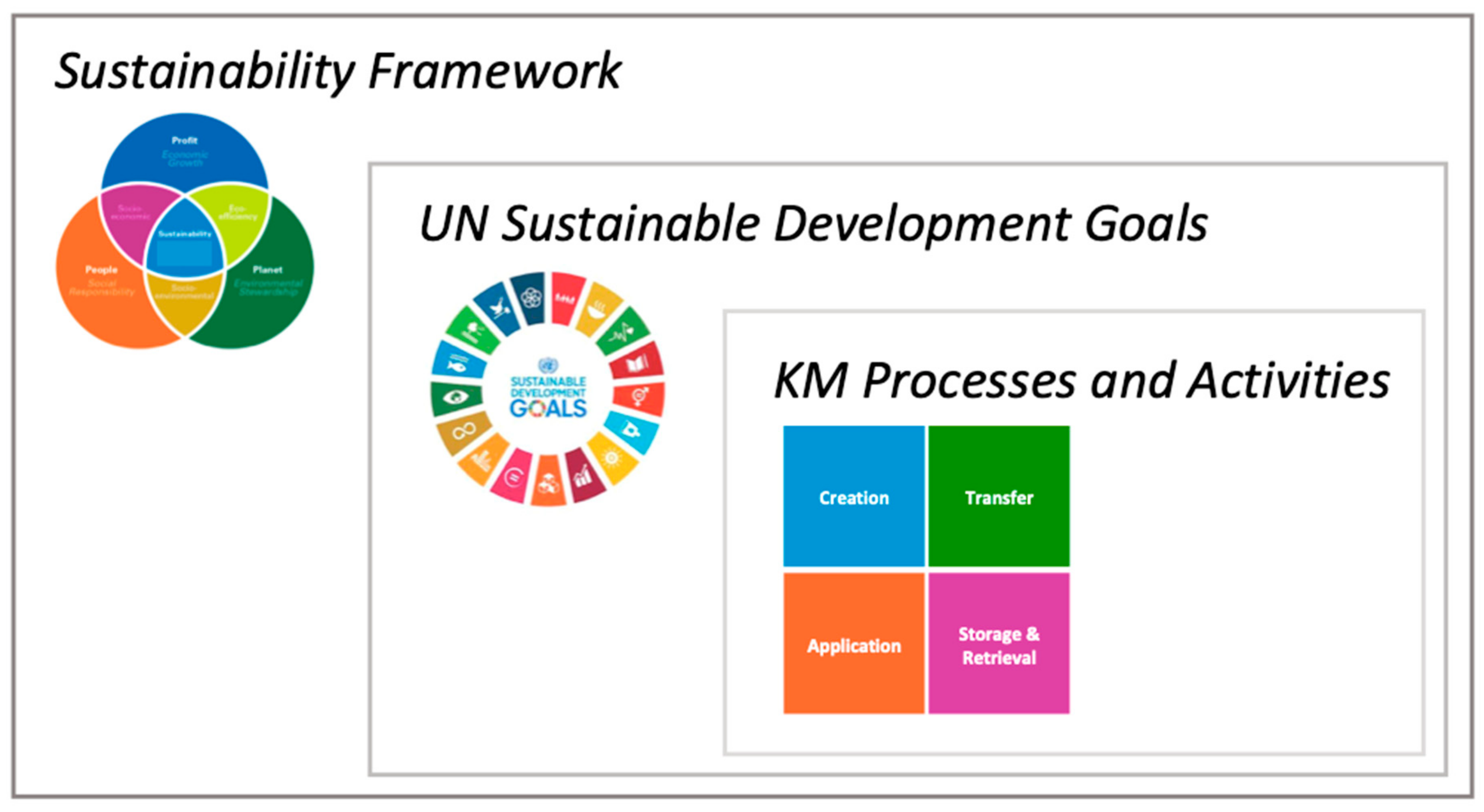
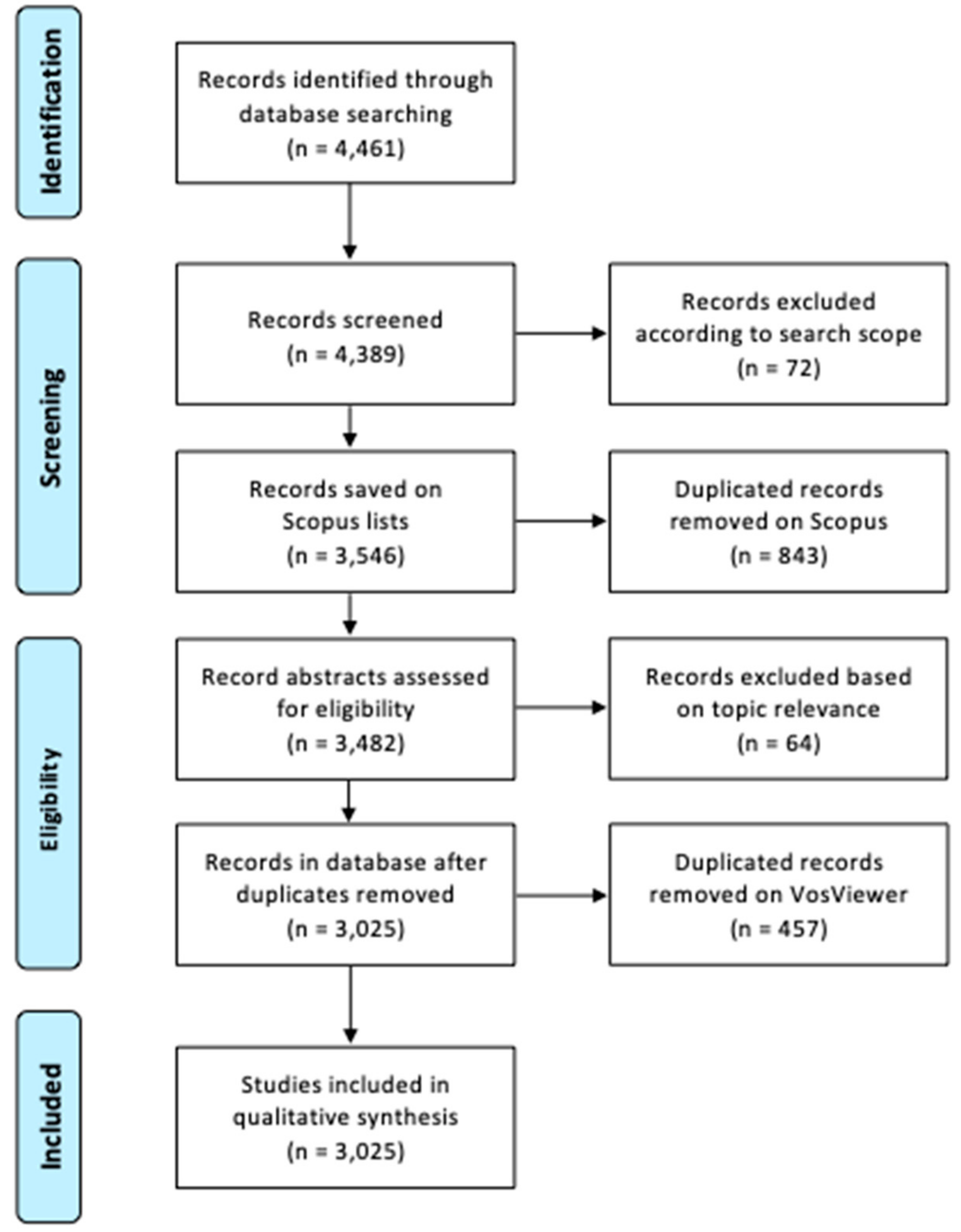
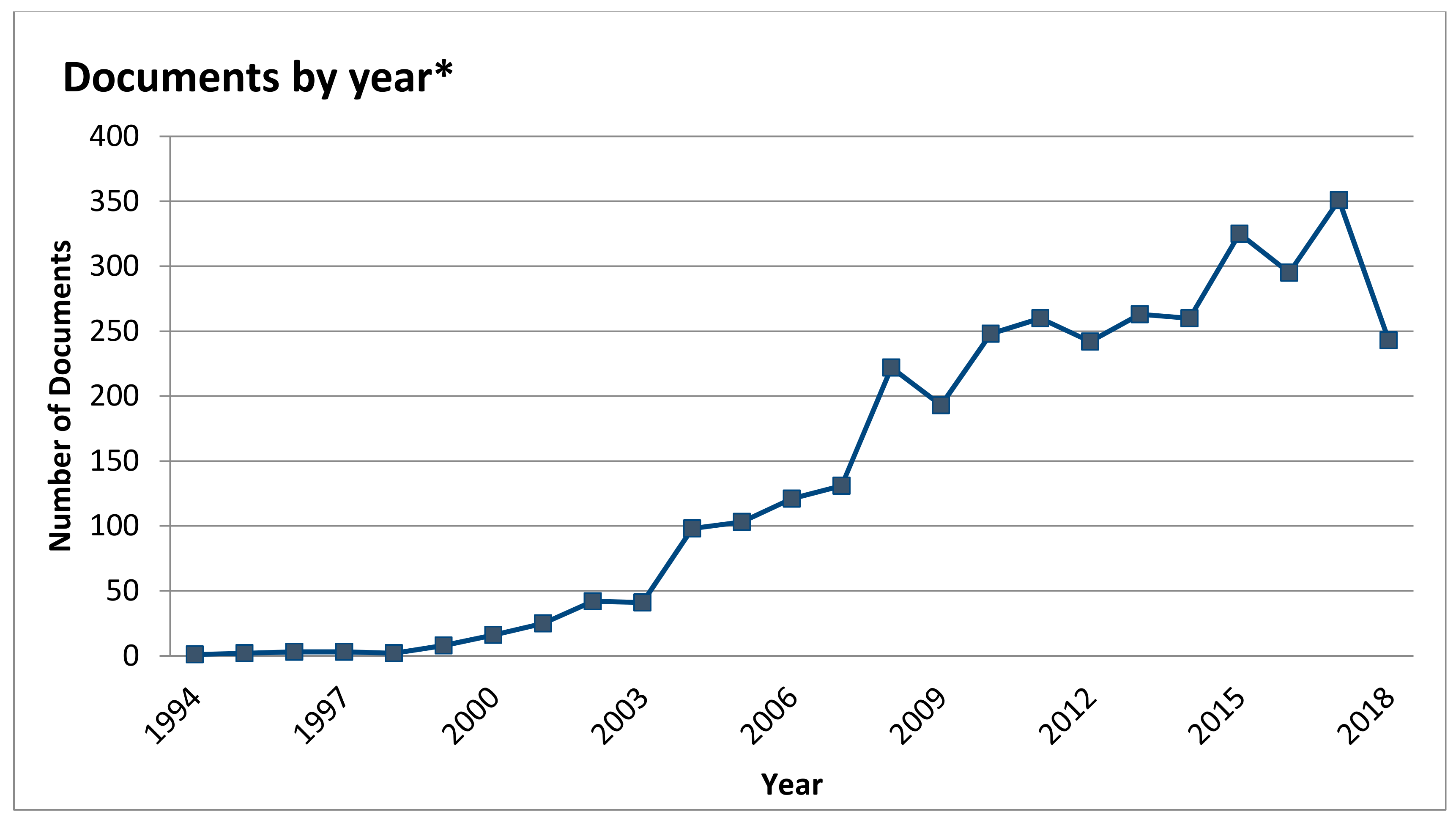
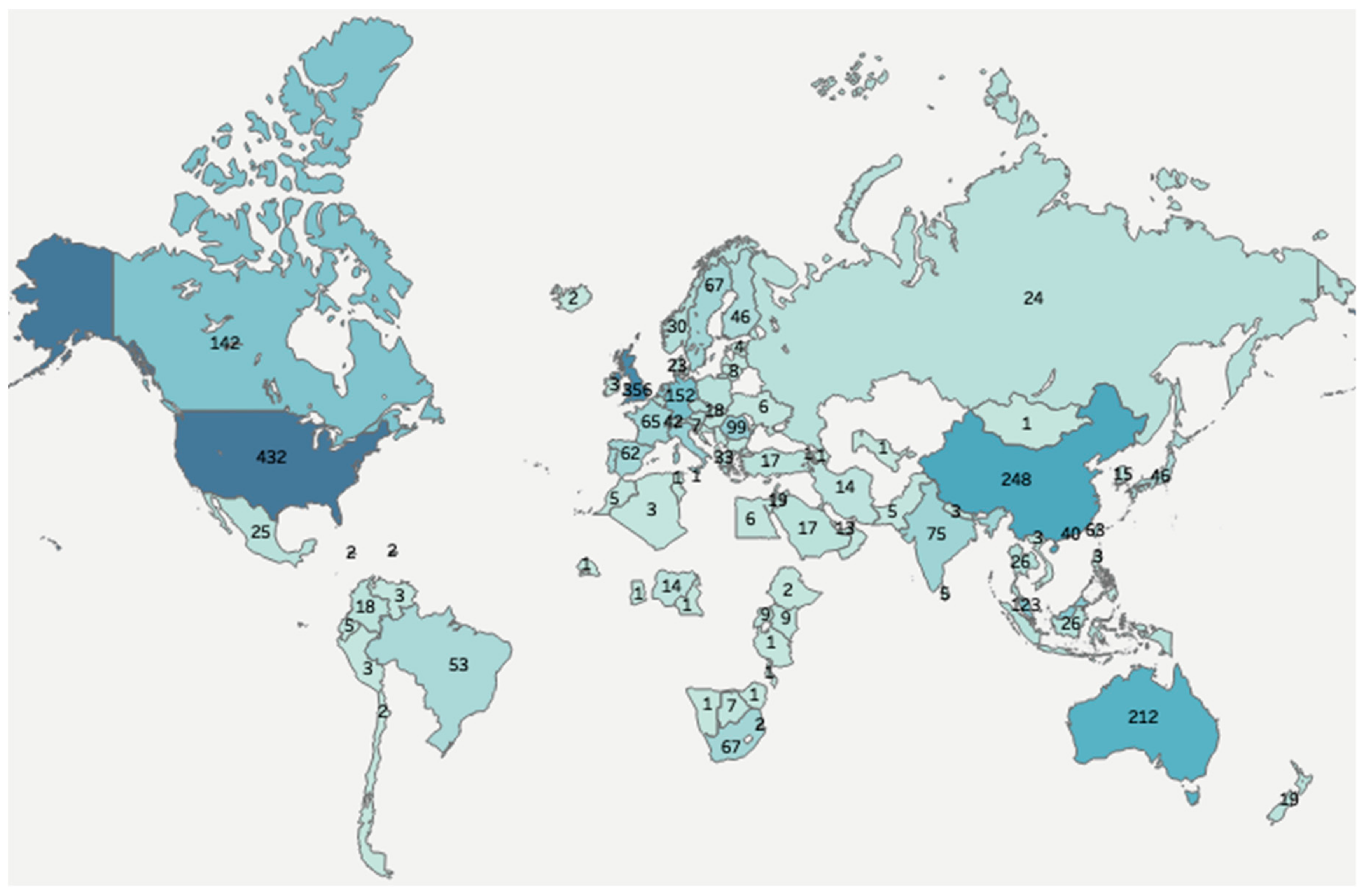
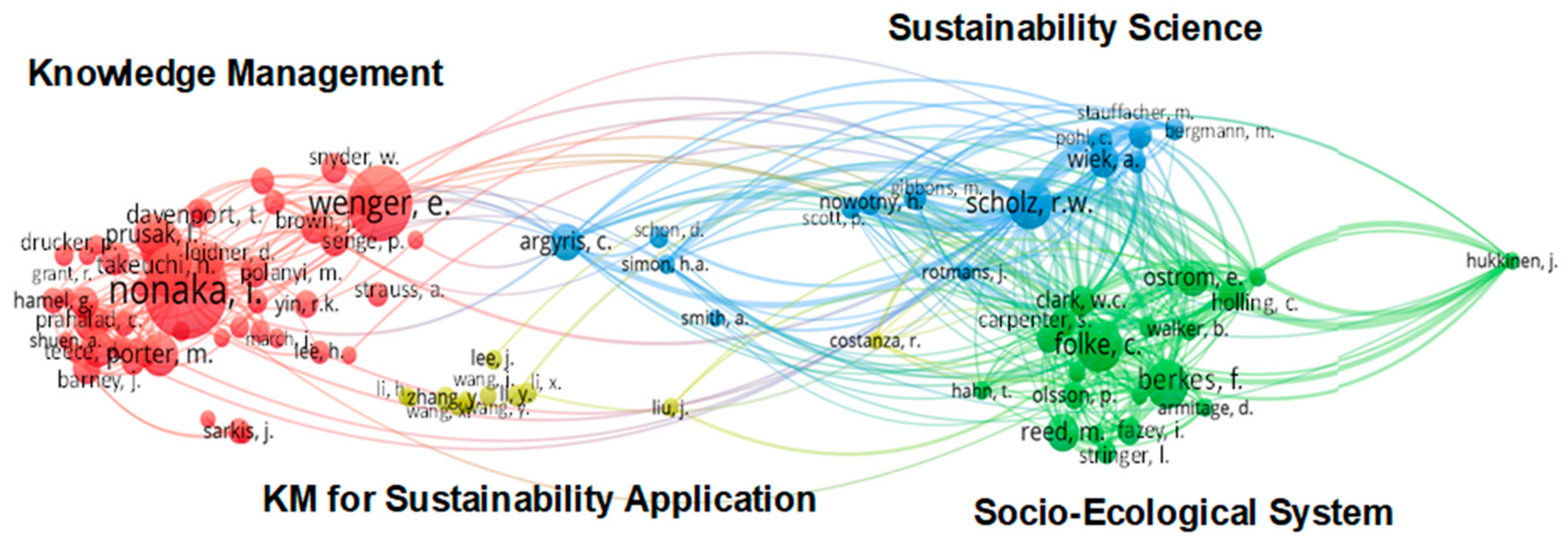
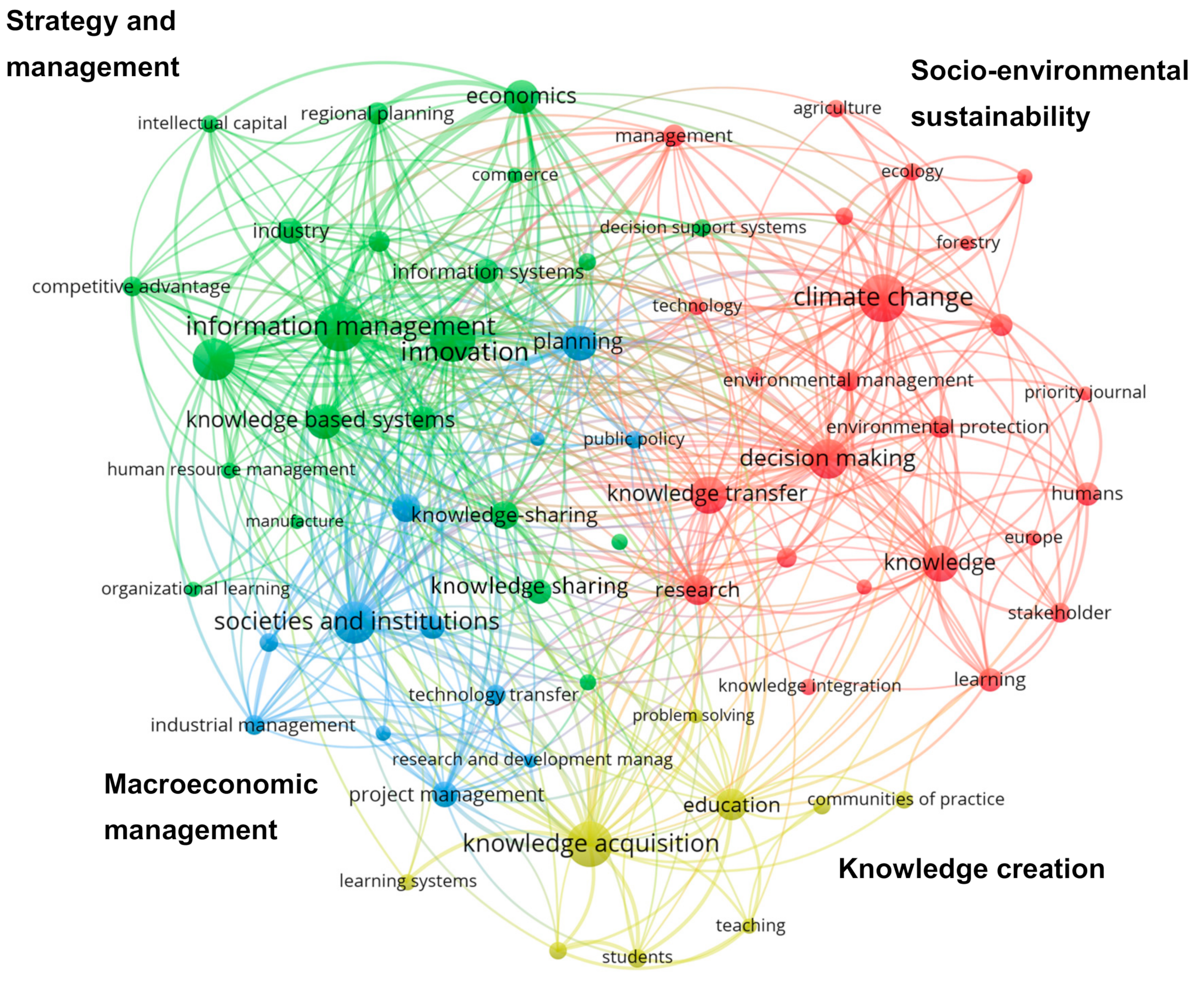
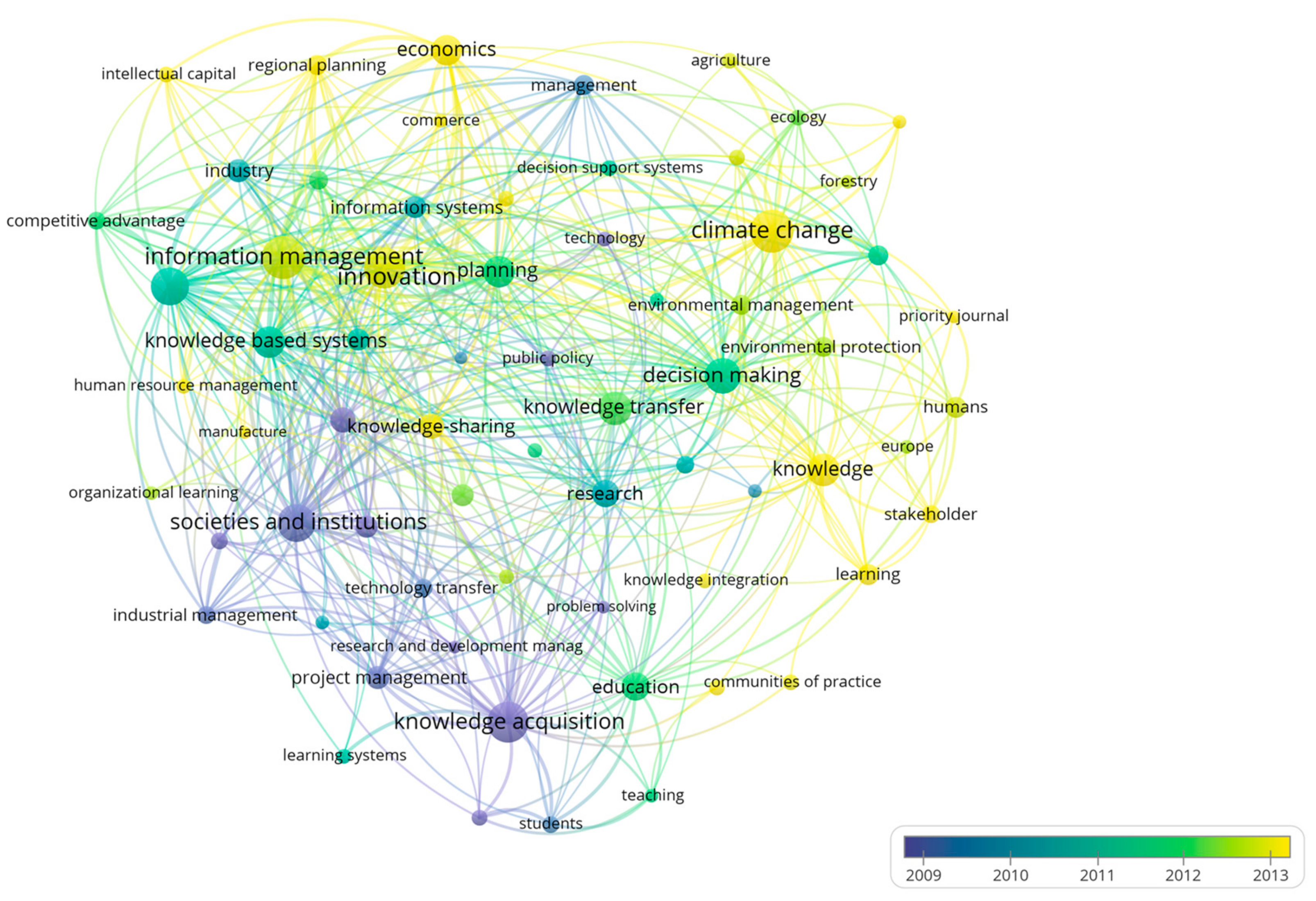
| Knowledge Management | Sustainability |
|---|---|
| Knowledge Management | Sustainability |
| Knowledge Management System | Sustainable Development |
| Knowledge Creation | Environmental Sustainability |
| Knowledge Acquisition | Social Sustainability |
| Knowledge Sharing | Economic Sustainability |
| Knowledge Transfer | Climate Change |
| Knowledge Adoption | |
| Knowledge Storage | |
| Knowledge Retrieval | |
| Knowledge Bank | |
| Knowledge Portal | |
| Knowledge Codification | |
| Knowledge Application | |
| Knowledge Verification | |
| Knowledge Based System | |
| Knowledge Integration | |
| Knowledge Behaviour | |
| Knowledge Worker | |
| Community of Practice |
| Author | University Affiliation | Country | Documents | Citations | CPD 1 | H-Index |
|---|---|---|---|---|---|---|
| D. Helbing | ETH Zurich | Switzerland | 2 | 798 | 399 | 70 |
| L. Bettencourt | U. of Chicago | USA 2 | 1 | 782 | 782 | 32 |
| C. Kühnert | Dresden U. of Technology | Germany | 1 | 782 | 782 | 6 |
| J. Lobo | Arizona State U. | USA | 1 | 782 | 782 | 19 |
| G. B. West | U. of Oxford | UK 3 | 1 | 782 | 782 | 44 |
| L. C. Stringer | U. of Leeds | UK | 5 | 586 | 117 | 32 |
| R. Phaal | U. of Cambridge | UK | 3 | 580 | 193 | 26 |
| M. S. Reed | Newcastle U. | UK | 4 | 564 | 141 | 38 |
| J. H. Dyer | Brigham Young U. | USA | 1 | 555 | 555 | 20 |
| N. W. Hatch | Brigham Young U. | USA | 1 | 555 | 555 | 9 |
| A. C. Evely | U. of St Andrews | UK | 3 | 546 | 182 | 14 |
| C. M. Raymond | Swedish U. of Agricultural Sciences | Sweden | 3 | 485 | 162 | 26 |
| I. Fazey | U. of St Andrews | UK | 2 | 475 | 238 | 33 |
| K. Yew Wong | U. Teknologi Malaysia | Malaysia | 1 | 436 | 436 | 25 |
| Y. Caloghirou | NTUA 4 | Greece | 1 | 424 | 424 | 15 |
| I. Kastelli | NTUA | Greece | 1 | 424 | 424 | 3 |
| A. Tsakanikas | NTUA | Greece | 1 | 424 | 424 | 7 |
| L. Van Kerkhoff | Australia National U. | Australia | 3 | 388 | 129 | 16 |
| P. Almeida | Georgetown U. | USA | 1 | 385 | 385 | 13 |
| A. Phene | U. of Utah | USA | 1 | 385 | 385 | 10 |
| Author | Research Focus | University/Affiliation | Country | Number of Citations | Link Strength | H- Index |
|---|---|---|---|---|---|---|
| I. Nonaka | Know Creation | Nhitotsubashi U. | Japan | 631 | 3633 | 29 |
| E. Wenger | Comm of Practice | Wenger-Trayner | USA | 404 | 1703 | 54 |
| C. Folke | Ecology & Society | Stockholm U. | Sweden | 265 | 5689 | 127 |
| R. W. Scholz | Sust Science | ETH Zurich 1 | Switzerland | 254 | 11110 | 59 |
| H. Takeuchi | Know Creation | Harvard U. | USA | 251 | 1528 | 9 |
| F. Berkes | Social-Eco System | U. of Manitoba | Canada | 236 | 4047 | 100 |
| L. Prusak | KM | Columbia U. | USA | 184 | 1129 | 46 |
| T. Davenport | Info Systems | Babson College | USA | 176 | 1121 | 88 |
| C. Argyris | Learning Orgs | Harvard U. | USA | 154 | 1906 | 23 |
| E. Ostrom | Inst’l Analysis | Indiana U. | USA | 152 | 3110 | 143 |
| A. Wiek | Transform Sust | Arizona State U. | USA | 145 | 3987 | 43 |
| M. E. Porter | Econ Devel | Harvard U. | USA | 133 | 806 | 162 |
| M. S. Reed | Stakeholder Part | Newcastle U. | UK | 133 | 1915 | 47 |
| M. Polanyi | Tacit Knowledge | U. of Oxford | UK | 130 | 1322 | 25 |
| R. M. Grant | Strategic Manage | Bocconi U. | Italy | 129 | 1143 | 41 |
| C. S. Holling | Ecological Sci | U. of Florida | USA | 126 | 3122 | 33 |
| W. C. Clark | Sust Development | Harvard U. | USA | 120 | 2404 | 48 |
| D. J. Teece | Strategic Manage | UC Berkeley | USA | 120 | 803 | 103 |
| J. Lave | Geology | CRPG-CNRS 2 | France | 119 | 722 | 32 |
| C. Pahl-Wostl | Resources Man | U. of Osnabrück | Germany | 112 | 1250 | 62 |
| M. Alavi | Info Systems | Georgia Tech 3 | USA | 112 | 652 | 40 |
| Author/Year | Title | Scopus Citations | School of Thought |
|---|---|---|---|
| Bettencourt (2007) | Growth, innovation, scaling, and the pace of life in cities [31] | 782 | Social |
| Hatch (2004) | Human capital and learning as a source of sustainable competitive advantage [32] | 555 | Economic |
| Phaal (2004) | Technology roadmapping—A planning framework for evolution and revolution [33] | 519 | Economic |
| Yew Wong (2005) | Critical success factors for implementing knowledge management in small and medium enterprises [34] | 436 | Economic |
| Caloghirou (2004) | Internal capabilities and external knowledge sources: Complements or substitutes for innovative [35] | 424 | Economic |
| Almeida (2004) | Subsidiaries and knowledge creation: The influence of the MNC and host country on innovation [36] | 385 | Economic |
| Raymond (2010) | Integrating local and scientific knowledge for environmental management [37] | 367 | Environ- mental |
| Schipper (2006) | Disaster risk, climate change and international development [38] | 292 | Environ- mental |
| Chandrase- garan (2013) | The evolution, challenges, and future of knowledge representation in product design systems [39] | 285 | Economic |
| Liu (2013) | Framing sustainability in a telecoupled world [40] | 277 | Integrated |
| Roux (2006) | Bridging the science-management divide: Moving from unidirectional knowledge transfer to [41] | 275 | Social |
| Van Kerkhoff (2006) | Linking knowledge and action for sustainable development [42] | 274 | Integrated |
| Olsen (2007) | The clean development mechanism’s contribution to sustainable development: A review [43] | 240 | Environ-mental |
| Nambisan (1999) | Organizational mechanisms for enhancing user innovation in information technology [44] | 238 | Economic |
| Dao (2011) | From green to sustainability: Information Technology and an integrated sustainability framework [45] | 229 | Environ-mental |
| Chambers (2013) | The dynamic sustainability framework: Addressing the paradox of sustainment amid ongoing change [46] | 226 | Integrated |
| Viviroli (2011) | Climate change and mountain water resources: Overview and recommendations for research [47] | 214 | Environ |
| Shen (2011) | The application of urban sustainability indicators—A comparison between various practices [48] | 205 | Social |
| Fuhrer (2003) | Ecological issues related to ozone: Agricultural issues [49] | 193 | Environ-mental |
| Sharif (2006) | Emergence and development of the National Innovation Systems concept [50] | 187 | Economic |
© 2019 by the authors. Licensee MDPI, Basel, Switzerland. This article is an open access article distributed under the terms and conditions of the Creative Commons Attribution (CC BY) license (http://creativecommons.org/licenses/by/4.0/).
Share and Cite
Sanguankaew, P.; Vathanophas Ractham, V. Bibliometric Review of Research on Knowledge Management and Sustainability, 1994–2018. Sustainability 2019, 11, 4388. https://doi.org/10.3390/su11164388
Sanguankaew P, Vathanophas Ractham V. Bibliometric Review of Research on Knowledge Management and Sustainability, 1994–2018. Sustainability. 2019; 11(16):4388. https://doi.org/10.3390/su11164388
Chicago/Turabian StyleSanguankaew, Pattarin, and Vichita Vathanophas Ractham. 2019. "Bibliometric Review of Research on Knowledge Management and Sustainability, 1994–2018" Sustainability 11, no. 16: 4388. https://doi.org/10.3390/su11164388
APA StyleSanguankaew, P., & Vathanophas Ractham, V. (2019). Bibliometric Review of Research on Knowledge Management and Sustainability, 1994–2018. Sustainability, 11(16), 4388. https://doi.org/10.3390/su11164388





